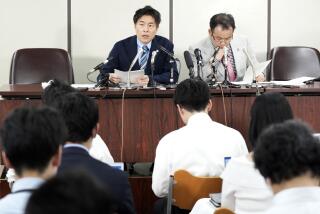Japan Widow Loses Religious Rights Case
- Share via
TOKYO — In a major setback for advocates of stronger separation of religion and state in Japan, the Supreme Court ruled Wednesday against a Christian woman who sued the government for violating her rights by enshrining her husband in a Shinto ceremony after he died on military duty.
The high court overturned two lower-court rulings that the “personal religious rights” of the widow, Yasuko Nakaya, 54, had been violated by Self-Defense Forces officials who helped in the enshrinement over her objections.
Shinto, which derives from the animistic, indigenous religion of the Japanese islands, evolved into a nationalistic cult during the period of rapid modernization earlier in the century and became the state religion, headed by the emperor, in Japan’s era of militarism.
Nakaya argued in her 1973 suit filed in Yamaguchi, on the southwestern tip of Honshu Island, that the enshrinement violated a provision in the postwar constitution forbidding government involvement in religious affairs.
Although her husband received a Christian burial and is worshiped at the Shinto shrine only in spirit, Nakaya argued that she had been denied her “personal right” to religious freedom because the enshrinement “disturbed my spiritual peace to quietly remember my husband.” The lower courts awarded her 1 million yen (about $8,000) in damages.
In Japanese law, personal rights are generally asserted in environmental cases. Applying the concept to religion was radical and untested, Nakaya’s attorney said.
“It’s a new concept as far as spiritual matters go,” said Kenkichi Nakahira, head of Nakaya’s team of lawyers. “We weren’t surprised the Supreme Court didn’t recognize it, given its conservative bent.”
More controversial than the widow’s personal rights, however, was the signal the court gave on the constitutional question of how far the government can go in sponsoring or cooperating with Shinto practices, Nakahira said.
Effect on Shrine Issue
The ruling is especially important for its expected effect on critics of the Yasukuni Shrine in Tokyo where the souls of Japan’s military martyrs, including convicted war criminals of World War II, are worshiped. Official visits to the shrine by cabinet ministers in recent years have aroused public indignation, and worship at the shrine has come to symbolize the ruling party’s attempts to erase the shame of World War II.
Citizen groups across Japan have been fighting court battles to block local government support of the shrine, and representatives of several anti-shrine groups assailed Wednesday’s ruling, the newspaper Asahi reported.
Nakaya’s case dates back 20 years, to when her husband, Takafumi, then 37, was killed in a car accident while a first lieutenant in the Self-Defense Forces, Japan’s military. A Christian, Nakaya buried her husband without incident at her church, but was surprised to learn four years later that an association of bereaved families planned to enshrine him along with 26 other men who died on duty.
She asked that her husband not be included and sued the government and the association the following year after he was enshrined at Gokoku Shrine in Yamaguchi.
The Supreme Court ruled Wednesday that the defense forces were not directly involved in the enshrinement but merely provided administrative help to the private association and did not cross the line separating religion and state or violate Nakaya’s rights.
But Nakahira, the lawyer, noted that eight of the 15 justices said the government should at least avoid the appearance of having an interest in religious affairs, and he counted this as a small victory.
“The real aim of this suit was to stop the Self-Defense Forces from meddling in people’s personal religious affairs, and I think we’ve accomplished that,” Nakahira said.
Japan’s Christians make up less than 1% of the population. Most Japanese are nominally Buddhist but participate in various Shinto rites, such as marriage ceremonies.
More to Read
Sign up for Essential California
The most important California stories and recommendations in your inbox every morning.
You may occasionally receive promotional content from the Los Angeles Times.













